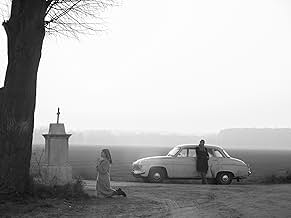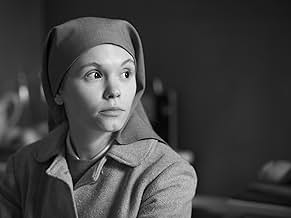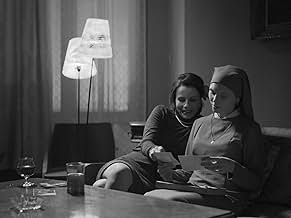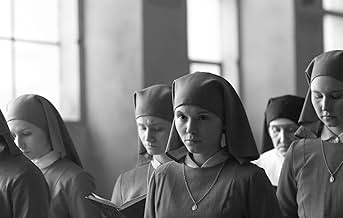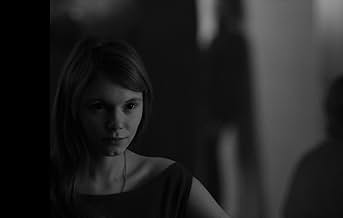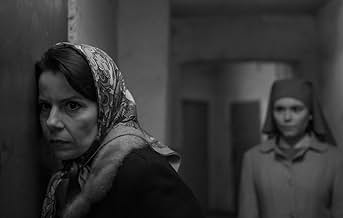AVALIAÇÃO DA IMDb
7,4/10
62 mil
SUA AVALIAÇÃO
Uma freira noviça prestes a fazer seus votos descobre um segredo de família que remonta à ocupação alemã.Uma freira noviça prestes a fazer seus votos descobre um segredo de família que remonta à ocupação alemã.Uma freira noviça prestes a fazer seus votos descobre um segredo de família que remonta à ocupação alemã.
- Direção
- Roteiristas
- Artistas
- Ganhou 1 Oscar
- 70 vitórias e 92 indicações no total
Natalia Lange
- Bronia
- (as Natalia Lagiewczyk)
Jan Wojciech Poradowski
- Father Andrew
- (as Jan Wociech Poradowski)
- Direção
- Roteiristas
- Elenco e equipe completos
- Produção, bilheteria e muito mais no IMDbPro
Avaliações em destaque
Ida was a dark somber tragic story expressed perfectly in film.
I am not a big fan of black and white "art" movies done for effect, except the old black and white movies, but Ida was filmed so perfectly, and the stark black and white was so integral to the story and feeling of the movie it was really perfect.
I am not a big fan of jazz either, but again, the choice of Coltrane's jazz music for parts of this film really let you feel what jazz is all about, it was beautiful.
The story was of an orphan nun who is preparing to take her final vows to God. The Mother Superior calls her in and tells her about who she is. Ida grew up not knowing her name or anything about her family. Ida finds that she has an aunt nearby and is told to go to see her before taking her vows.
The slow, heavy and deliberate pace of the movie express the story so perfectly, and there is no pandering or cheap shots, the movie is beautifully done. This is a story that is not for everyone, or every time, but I am glad it was made and that I saw it.
I have to give it a 10/10 for pure craftsmanship and cinematic perfection.
I am not a big fan of black and white "art" movies done for effect, except the old black and white movies, but Ida was filmed so perfectly, and the stark black and white was so integral to the story and feeling of the movie it was really perfect.
I am not a big fan of jazz either, but again, the choice of Coltrane's jazz music for parts of this film really let you feel what jazz is all about, it was beautiful.
The story was of an orphan nun who is preparing to take her final vows to God. The Mother Superior calls her in and tells her about who she is. Ida grew up not knowing her name or anything about her family. Ida finds that she has an aunt nearby and is told to go to see her before taking her vows.
The slow, heavy and deliberate pace of the movie express the story so perfectly, and there is no pandering or cheap shots, the movie is beautifully done. This is a story that is not for everyone, or every time, but I am glad it was made and that I saw it.
I have to give it a 10/10 for pure craftsmanship and cinematic perfection.
simplicity, great photographs, splendid script. at first sigh, an old fashion movie. in fact, wise manner to use the legacy of impressive tradition and a great director who use, in same measure, with same precision, tension, poetry of images, atmosphere of period, cultural roots. it is a reflection occasion about origins, truth, faith and choices. a profound Polish story who reflects the identity search of an entire continent. it is , certainly, a rare gem. the cause is not only beauty of photography or admirable acting but a special flavor who remains after its end as a delicate feeling. a young woman and the courage to become here self. that is all. in skin of seductive music.
Ida is magnificent, it will stay with me a long time. The narrative is powerfully compelling and yet if it had been a non-narrative film I would have been spellbound by the images alone. They should make a coffee table book of stills from it. Huge emotional issues are dealt with in a remarkably understated, unsentimental, but appropriate way. The use of music (often my pet peeve in these days of Hollywood formula) is enlightened and illustrative. I don't think the ending is ambiguous, I'm not sure the writer who wrote that understood it. Perhaps there is something slightly facile about the way things wrap up in the last 15 minutes of the film, but this is only in comparison with how beautifully they are laid out before that. Enough, this is not really a review, it is an exhortation - Go see Ida!
This film is recommended.
Anna grew up in a Catholic orphanage, never knowing her parents. Deeply religious, she is slated to become a nun within a few weeks. However, before taking her vows, Anna must leave the convent and visit her only living relative, a cold and distant aunt. Upon their first meeting, she is told that she is really Ida, a Jewish niece. So begins their relationship and journey to find her past and specifically, her parent's unmarked graves.
With an unusually short film length of less than 90 minutes, Ida is an extremely well made film, sensitively directed by Pawel Pawlikowski. Under the backdrop of 1960's Poland, the film's premise of presenting contrasting religions and lifestyles is its main attraction. The screenplay by the director and Rebecca Lenkiewicz has much to say and tells its linear narrative concisely and without any flourish.  Ida is a fine film that could have been a great film had its script added more dimension to its central character. Anna, or Ida, is mainly a saintly conduit, a devout presence who never seems to be real in any sense. She begins as an enigma and, surprisingly, rarely displays any strong emotional reaction when confronted with disturbing news.
Agata Trzebuchowska plays Ida / Anna and she is physically right for the role. The actress invests the right degree of innocence and vulnerability. Even more effective is Agata Kulesza as Ida's bitter and alcoholic Aunt Wanda. Her role has far more depth and the actress makes subtle choices in underplaying the anger and hostility within her complex character. It is a strong and memorable performance.
The film, beautifully photographed by Ryszard Lenczewski and Lukasz Zal, might have a smaller budget than most movies these days, but one never notices any lapse in quality as production values are of the highest caliber. With lovely black & white images and a lyrical score by Kristian Eidnes Andersen, Ida is superior filmmaking, even if some of the transitions and editing seems slightly abrupt. The film effectively deals with powerful themes that will resonate with any serious film-goer and deserves to be seen. GRADE: B
Visit my blog at: www.dearmoviegoer.com
ANY COMMENTS: Please contact me at: jadepietro@rcn.com
Anna grew up in a Catholic orphanage, never knowing her parents. Deeply religious, she is slated to become a nun within a few weeks. However, before taking her vows, Anna must leave the convent and visit her only living relative, a cold and distant aunt. Upon their first meeting, she is told that she is really Ida, a Jewish niece. So begins their relationship and journey to find her past and specifically, her parent's unmarked graves.
With an unusually short film length of less than 90 minutes, Ida is an extremely well made film, sensitively directed by Pawel Pawlikowski. Under the backdrop of 1960's Poland, the film's premise of presenting contrasting religions and lifestyles is its main attraction. The screenplay by the director and Rebecca Lenkiewicz has much to say and tells its linear narrative concisely and without any flourish.  Ida is a fine film that could have been a great film had its script added more dimension to its central character. Anna, or Ida, is mainly a saintly conduit, a devout presence who never seems to be real in any sense. She begins as an enigma and, surprisingly, rarely displays any strong emotional reaction when confronted with disturbing news.
Agata Trzebuchowska plays Ida / Anna and she is physically right for the role. The actress invests the right degree of innocence and vulnerability. Even more effective is Agata Kulesza as Ida's bitter and alcoholic Aunt Wanda. Her role has far more depth and the actress makes subtle choices in underplaying the anger and hostility within her complex character. It is a strong and memorable performance.
The film, beautifully photographed by Ryszard Lenczewski and Lukasz Zal, might have a smaller budget than most movies these days, but one never notices any lapse in quality as production values are of the highest caliber. With lovely black & white images and a lyrical score by Kristian Eidnes Andersen, Ida is superior filmmaking, even if some of the transitions and editing seems slightly abrupt. The film effectively deals with powerful themes that will resonate with any serious film-goer and deserves to be seen. GRADE: B
Visit my blog at: www.dearmoviegoer.com
ANY COMMENTS: Please contact me at: jadepietro@rcn.com
Greetings again from the darkness. Writer/director Pawel Pawlikowski films in his homeland of Poland and presents a familiar topic from a most unusual perspective. This film has been very well received on the festival circuit and it's easy to see why: it's beautifully photographed, very well acted, includes terrific music and presents an emotional story for intelligent viewers.
We first meet Anna as a novitiate nun on the verge of taking her vows. Her Mother Superior has one requirement. Anna must visit her lone surviving relative. Her Aunt Wanda is everything Anna is not: worldly, cynical, direct. In the first few minutes of their visit, Wanda (Agata Kulesza) informs Anna (Agata Trzebuchowska) that she was born Jewish with the name Ida, and she was sent to a Catholic orphanage when her parents were killed.
After this bombshell, the two set out on a journey to discover the truth and trace their roots. It's a journey of discovery not just for Ida, but also for Wanda, who carries her own burden. Questioning one's faith and one's true identity is nothing new, but this makes for quite an unusual buddy road trip. Wanda is rarely without a drink in hand and Ida has had no previous exposure to the real world.
This is the debut of Agata Trzebuchowska and her porcelain look and big eyes convey a quality with which we find ourselves comfortable with, while Ms. Kulesza evokes empathy from the viewer despite her harsh edge and beaten down outlook on life and people. Hers is a standout performance.
Two exceptional pieces of music are used to perfection: Coltraine's "Naima" and Mozart's "Jupiter" symphony. The storytelling and look of the film might be austere (stunning black and white photography) but this music hits us hard in two separate scenes.
We first meet Anna as a novitiate nun on the verge of taking her vows. Her Mother Superior has one requirement. Anna must visit her lone surviving relative. Her Aunt Wanda is everything Anna is not: worldly, cynical, direct. In the first few minutes of their visit, Wanda (Agata Kulesza) informs Anna (Agata Trzebuchowska) that she was born Jewish with the name Ida, and she was sent to a Catholic orphanage when her parents were killed.
After this bombshell, the two set out on a journey to discover the truth and trace their roots. It's a journey of discovery not just for Ida, but also for Wanda, who carries her own burden. Questioning one's faith and one's true identity is nothing new, but this makes for quite an unusual buddy road trip. Wanda is rarely without a drink in hand and Ida has had no previous exposure to the real world.
This is the debut of Agata Trzebuchowska and her porcelain look and big eyes convey a quality with which we find ourselves comfortable with, while Ms. Kulesza evokes empathy from the viewer despite her harsh edge and beaten down outlook on life and people. Hers is a standout performance.
Two exceptional pieces of music are used to perfection: Coltraine's "Naima" and Mozart's "Jupiter" symphony. The storytelling and look of the film might be austere (stunning black and white photography) but this music hits us hard in two separate scenes.
Você sabia?
- CuriosidadesPawel Pawlikowski had such difficulty finding an actress to play the titular character that he asked his friends to take secret photographs if they saw anyone who was in the right ballpark of the character. One of his friends, director Malgorzata Szumowska, saw Agata Trzebuchowska in a Warsaw café, took the picture and persuaded her to audition. She agreed to meet with Pawlikowski because she was a fan of his film Meu Amor de Verão (2004).
- Erros de gravaçãoWhen Ida is in a church, the priest seems to be getting ready to say Mass and we see a versus populum altar, which didn't become the norm until years later after Vatican II. The movie takes place in 1961 and the priest would have been saying Mass on the high altar.
- ConexõesFeatured in 72nd Golden Globe Awards (2015)
- Trilhas sonorasSerduszko puka w rytmie cha-cha
Music by Romuald Zylinski
Lyrics by Janusz Odrowaz-Wisniewski
Performed by Maria Koterbska
Principais escolhas
Faça login para avaliar e ver a lista de recomendações personalizadas
- How long is Ida?Fornecido pela Alexa
Detalhes
Bilheteria
- Orçamento
- US$ 1.000.000 (estimativa)
- Faturamento bruto nos EUA e Canadá
- US$ 3.827.060
- Fim de semana de estreia nos EUA e Canadá
- US$ 55.438
- 4 de mai. de 2014
- Faturamento bruto mundial
- US$ 11.156.836
- Tempo de duração1 hora 22 minutos
- Cor
- Mixagem de som
- Proporção
- 1.37 : 1
Contribua para esta página
Sugerir uma alteração ou adicionar conteúdo ausente




